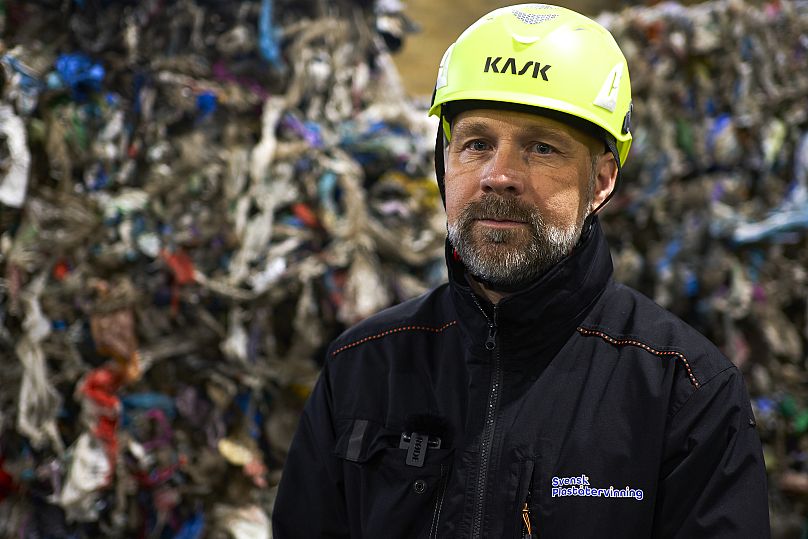Hailed as a ‘game changer’, the site is big enough to receive all plastic packaging waste generated from Swedish households.
A new Swedish factory can recycle more plastic packaging than any other site in the world, according to the non-profit behind it.
 ADVERTISEMENT
ADVERTISEMENT
 ADVERTISEMENT
ADVERTISEMENT
The ‘Site Zero’ plant in the city of Motala is being billed as the biggest of its kind, capable of sorting up to 20,000 tonnes of plastic packaging a year.
It’s not simply size but cutting-edge technology that makes this feat possible. Infrared red cameras are used to separate the tide of waste arriving at the factory gates into 12 different types of plastic.
This should double the amount of plastic packaging being recycled in the country, according to Sweden Plastic Recycling, co-owned by Swedish plastics, food and trade industry groups.
“It’s a game changer,” said Åsa Stenmarck, of the Swedish Environment Protection Agency. “Not just the sorting itself, but that they actually believe there is finally a market” for all 12 types of plastic sorted by the plant.
Robert Blasiak, a researcher at the Stockholm Resilience Center, said Sweden is “ahead of the curve” when it comes to plastics recycling, and that waste management in many other parts of the world has a long way to go.
Global plastic waste is set to triple by 2060
Site Zero’s launch on Wednesday (15 November) comes midway through talks to develop a global treaty on plastic pollution. This week, nations, petrochemical companies and environmentalists are gathering in Nairobi, Kenya for a third round of UN-backed negotiations to secure this landmark, legally-binding instrument.
It can’t come soon enough, as plastic waste produced globally is set to triple by 2060, with about half ending up in landfill and under one-fifth recycled.
The world currently produces more than 430 million tonnes of plastic annually, two-thirds of which are short-lived products that soon become waste, filling the ocean. And, as a recent UN Environment Programme report found, often working their way into the human food chain.
“A closed loop for plastics has to be the end goal, really, not just for corporations and governments, but for this UN plastics treaty that’s being negotiated now,” says Blasiak.
“And that means that every stage along the plastic lifecycle, basically the emissions moving through these life stages need to be reduced to zero.”
The Swedish plant will send almost all plastic packaging for recycling
At Site Zero, the roar of the machines is deafening as conveyor belts carry 40 tonnes per hour of mixed plastic waste through the entrails of the factory.
Gradually, as the chocolate wrappers, plastic bags, yoghurt containers or white polystyrene progress across the 60,000 square-metre complex, it’s broken down, separated by size and sorted in a fully automated process reliant on infrared cameras.
An old plant at the same location could only sort five types of plastic, which meant that only 47 per cent of the material was sent on for recycling and the rest was incinerated, said Mattias Philipsson, CEO of Sweden Plastic Recycling.
The new plant will be able to send up to 95 per cent of the packaging for recycling, minimising the amount that is incinerated. Burning plastic has a climate impact by adding greenhouse gases to the atmosphere.
What happens to the recycled plastic?
Once sorted, plastic can be recycled in the conventional, mechanical way or via a chemical recycling method, which typically uses heat or chemical solvents to break down plastics into liquid and gas to produce an oil-like mixture or basic chemicals.
Industry leaders say that mixture can be made back into plastic pellets to make new products. But environmental groups say that chemical, or advanced, recycling is a distraction from real solutions like producing and using less plastic.
Philipsson said that even though the more efficient sorting facility will help raise the amount of plastic being recycled in Sweden, it will also depend on households properly separating their waste.
“Most plastics are still incinerated because they haven’t been sorted by households,” he said.











